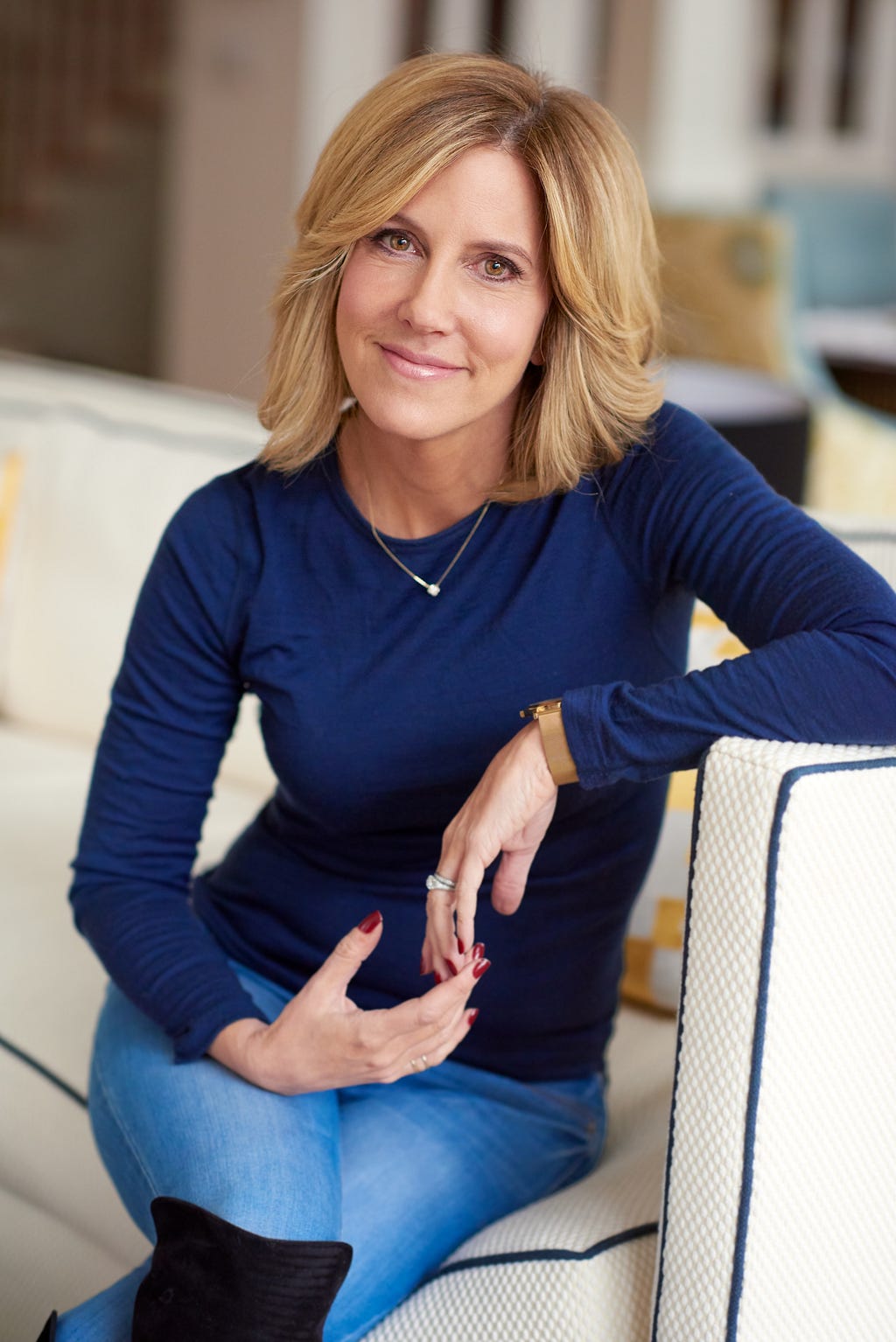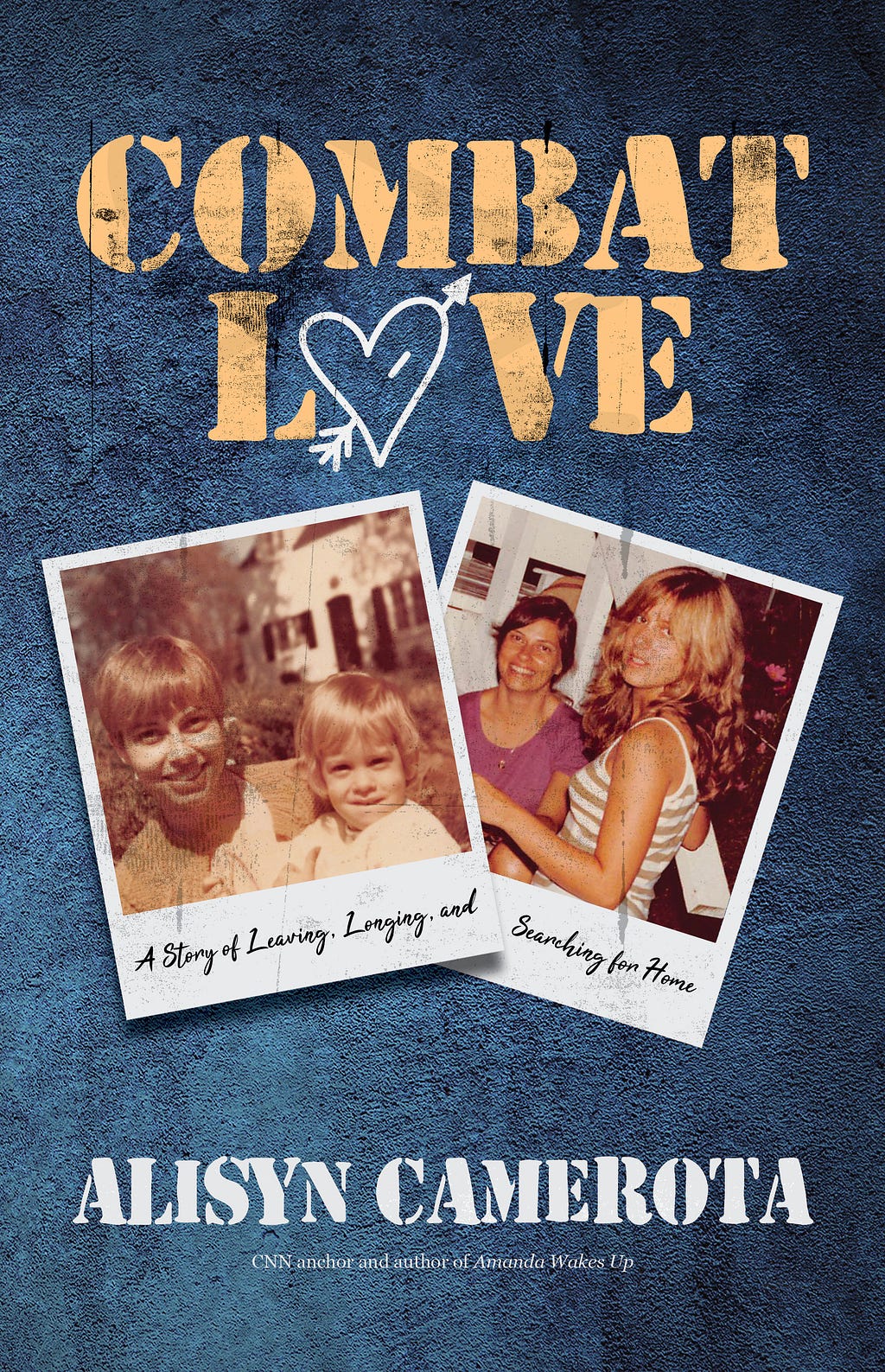
#1) The old writing adage of Show, Don’t Tell is wrong. It should be Show AND Tell. During the first version of this book, I tried to just SHOW stories and no one understood what I was trying to say. Only when I added the TELL part, including context and explanation, did everything click.
#2) Write every day, even if you can only carve out five minutes (but allow yourself to go as long as you can)
#3) Write what moves you. Your enthusiasm for the subject will be contagious and readers will pick up on it.
#4) Let your trusted friends read your pages. You’ll be amazed by their good advice (ignore what doesn’t work for you).
#5) Be observant. Write about what amazes, aggravates or amuses you.
We had the pleasure of interviewing Alisyn Camerota. Alisyn is an EMMY award-winning journalist, author, anchor and correspondent for CNN, whose first memoir (and second book) “Combat Love” out March 26 tells her story of longing for stability and attachment as the foundation of her family crumbled.
“A candid chronicle of hard-won survival,” Kirkus Reviews raves as Combat Love chronicles
Camerota’s near-misses and misadventures in the free-range 1980s at gritty clubs like CBGB, coupled with the sex, drugs and punk rock of that era.
Alisyn’s debut novel, Amanda Wakes Up, was selected by National Public Radio as one of the best books of 2017, and by Oprah Magazine as “a must read.”
Thank you so much for joining us Alisyn! Can you share a story about what brought you to this particular career path?
I’ve always been a storyteller (I believe New Jersey specializes in people who tell and enjoy stories — from Bruce Springsteen and Frank Sinatra to Meryl Streep and Queen Latifah). So whether it’s journalism (which is telling the stories of other people) or memoir-writing (telling your own story), it’s the same skill set. Even before it was my career, I liked telling stories to my friends and family. Stories are the age-old, powerful way we define each other, our environment, and the era we live in.
Can you share the most interesting story that occurred to you in the course of your career?
As you’ll read in Combat Love, my work as a crime reporter for the TV show America’s Most Wanted provided tons of fascinating stories. I’ve always been drawn to trying to decipher what makes criminals tick and sitting in a prison cell across from a serial rapist or cold-blooded killer gave me that chance. One of the most interesting stories that I include in the book was the case of a particularly violent, ruthless guy who shocked me by confessing during our interview.
What was the biggest challenge you faced in your journey to becoming an author? How did you overcome it? Can you share a story about that that other aspiring writers can learn from?
Time is always a challenge. Trying to write a book while juggling a demanding full-time job and family ain’t easy, which is why this book took me roughly a dozen years to finish. A fellow writer gave me the advice to write for half an hour a day, which keeps the story percolating on the page and in your brain. I couldn’t always pull that off. I didn’t have half an hour. But I could usually write for five minutes a day. So, I’d start there — and some days that turned into an hour. Do that and you’ll be able to complete a book.
Can you share a story about the funniest mistake you made when you were first starting? Can you tell us what lesson you learned from that?
The mistakes I made when I was starting as a TV reporter were much more public and humiliating than the ones I’ve made as a writer, which thank God, happen in the privacy of my home. As a TV reporter, my mind once went blank in the middle of a liveshot. So the viewers had to watch me blinking for a solid four or five seconds (an eternity on live TV), waiting for my synapses to reconnect. I also said “garnish a gun” when I meant “brandish.”
What are some of the most interesting or exciting projects you are working on now?
I recently did an hour-long special on the booming business of superyachts, during which I got to check out a bunch of megayachts and gigayachts (some of the biggest in the world). It was a fascinating window into the lives of the uber-rich. I’m also shooting stories on how attitudes about college education are shifting among young people with 20-something-year olds wondering if the time and money was worth it?
Can you share the most interesting story that you shared in your book?
I hope the whole book is interesting! I think women my age, and many mothers and daughters, will relate to the tension between my mother’s pursuit of happiness versus my own. I learned early that those were mutually exclusive, so I left home at sixteen. I developed a strong impulse to escape hard situations, which often saved me.
What is the main empowering lesson you want your readers to take away after finishing your book?
Having to rely on yourself can be frightening — but it can also be empowering. Giving your teenage kids a little more room to discover that is not a bad thing.

Based on your experience, what are the “5 Things You Need to Know to Become a Great Author”? Please share a story or example for each.
#1) The old writing adage of Show, Don’t Tell is wrong. It should be Show AND Tell. During the first version of this book, I tried to just SHOW stories and no one understood what I was trying to say. Only when I added the TELL part, including context and explanation, did everything click.
#2) Write every day, even if you can only carve out five minutes (but allow yourself to go as long as you can)
#3) Write what moves you. Your enthusiasm for the subject will be contagious and readers will pick up on it.
#4) Let your trusted friends read your pages. You’ll be amazed by their good advice (ignore what doesn’t work for you).
#5) Be observant. Write about what amazes, aggravates or amuses you.
What is the one habit you believe contributed the most to you becoming a great writer? (i.e. perseverance, discipline, play, craft study). Can you share a story or example?
Determination. I got many rejections from publishing houses as I tried to sell this book. But I never for a minute thought that meant the book shouldn’t be published. It meant I had to fix the weaknesses with it and try again. In other words, don’t take “no” as a final answer. Ultimately, I found the perfect publisher (Rare Bird), who truly understood the meaning and message of the book.
Which literature do you draw inspiration from? Why?
Because I’ve just written a memoir, I’ve been on a memoir-reading kick for a few years. I really like reading the story of people’s real lives, rather than stories from their imaginations.
You are a person of enormous influence. If you could start a movement that would bring the most amount of good to the most amount of people, what would that be? You never know what your idea can trigger. 🙂
I believe music is the great connector. Let’s stop being divided by politics and start being united by music. Let’s talk about the first concerts we went to and I guarantee we’ll find a bigger and more enduring connection than if we talk about who we vote for.
How can our readers follow you on social media?
I’m most active on Instagram @alisyncamerota and TikTok @alycam.writes. YouTube is where I post personal videos.
Thank you so much for this. This was very inspiring!
CNN’s Alisyn Camerota On The 5 Things You Need to Know to Become a Great Author was originally published in Authority Magazine on Medium, where people are continuing the conversation by highlighting and responding to this story.
